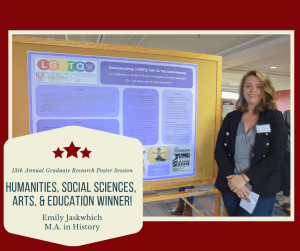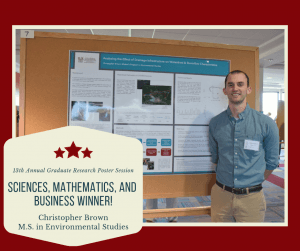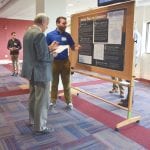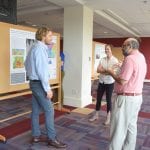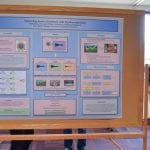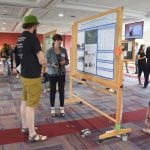On Wednesday, March 13th, the University of Charleston, S.C. held our 13th Annual Graduate Research Poster Session! The Graduate Student Poster Session provides an introduction to the impressive research activities currently taking place in our graduate programs. Students are encouraged to participate even if they are only in the beginning stages of their studies. The Poster Session recognizes the ongoing contributions of graduate students to the betterment of our local, state and global communities.
This year, we had 20 incredible entries into our poster session, with representatives from 8 programs present! Below are descriptions of all the winning projects from this year’s competition:
WINNER: HUMANITIES, SOCIAL SCIENCES, ARTS, & EDUCATION:
Documenting LGBTQ Life in the Lowcountry
Presenter: Emily Jaskwhich
Program: M.A. in History
“Through centuries of discrimination and criminalization, LGTBQ communities have been conditioned to be discrete and secretive, which has detrimentally affected any efforts to record the history of these communities. In recent decades, the fields of gender and sexuality studies have become increasing popular and scholars have quickly realized that sources are next to nonexistent. The groundbreaking project, Documenting LGBTQ Life in the Lowcountry, was developed with this problem in mind and is working to fill the evidentiary gap concerning LGBTQ life in South Carolina. The mission of this project is two-fold, developing a permanent LGBTQ archival collection in the College’s Special Collections Department and documenting the personal narratives of LGBTQ individuals through oral history interviews. While there are several projects throughout the country endeavoring to preserve LGBTQ history, very few are based in the Deep South and even less are attempting both archival and oral history preservation. Since its inception in June 2018, the project has processed three archival collections, that are now available for researchers, and conducted nearly thirty oral history interviews, nine of which are weeks away from being published online through the Lowcountry Digital Library. The project is ongoing, and hopefully will be for years to come, but within the span of a year, it has already produced an impressive collection of information on a subject that was virtually impossible to research prior to this project.”
WINNERS: SCIENCES, MATHEMATICS, & BUSINESS:
Analyzing the Effect of Drainage Infrastructure on Watershed & Stormflow Characteristics
Presenter: Christopher Brown
Program: M.S. in Environmental Studies
“A traditional practice in stormwater management is to install drainage ditches and culverts that carry runoff away from areas of development and toward tidal creeks. This practice alters the natural flow of water, affecting the water balance and ecology of tidal creeks and marshes. We are analyzing the effect of human infrastructure on drainage basin shape and size and evaluating how these changes have altered stormwater runoff volumes and peak flow rates during storm events compared to how watersheds would behave in an unaltered state. Drainage modifications also allow for tidal flooding to reach further upstream than would naturally occur. The increased tidal flooding increases the frequency of compound flooding events (the coincidence of tidal flow and stormflow), where neither input would have resulted in flood conditions individually. We are assessing the tidal and non-tidal flow of the study creek and building upon recent research to model tidal conditions in coastal South Carolina. These models will be linked to a stormwater modeling system (SWARM) to identify the conditions when stormwater volume exceeds the tidal volume within the creek, and the influence of stormwater, tidal flow, and groundwater discharge will be modeled in relation to water depth, thereby highlighting the conditions when and where flooding can occur.”
Captive populations as a tool for wildlife research: Non-invasive methods assess the stress hormones and health of gentoo penguins
Presenter: Jessica Karan
Program: M.S. in Marine Biology
“Recent studies on gentoo penguins, Pygoscelis papua, have revealed significant differences in the health of several Antarctic colonies, but the source(s) of these differences remains unknown. Sampling limitations and data deficiencies have made it difficult to establish correlations with gentoo health measurements. Captive populations therefore provide an invaluable tool for discovering more about animal biology, as they are easily accessible and detailed long-term records are maintained for each individual. By assessing captive gentoo populations, I seek to determine variables that have a significant effect on gentoo penguin corticosterone levels and ornamental coloration, both of which provide an index of health. These parameters are measured non-invasively through analyses of feather hormones and carotenoids in penguin beak spots. Samples from eight wild gentoo colonies will also be compared to the captive penguins. Partnering with several zoos and aquariums across the country will allow my findings to reach a wide audience, and my results will give institutions a better opportunity to understand their animals and possibly improve overall husbandry practices. Ultimately, I hope to better inform research and conservation decisions for wild gentoo populations.”
PEOPLE’S CHOICE WINNER:
The Effects of a Child Life Directed Teddy Bear Clinic on Preschooler’s Knowledge
Presenters: Maura Burns, Chelsie Lang, Katherine Lowe, & Haley-Marie Ragan
Program: M.S. in Child Life
“Teddy bear clinics educate children about medical settings, procedures, and medical personnel. A teddy bear clinic is an interactive educational intervention for children to use a stuffed animal as their patient while they perform medical procedures on their stuffed animal. Children use their stuffed animal “patients” in various medical stations to practice the procedures with realistic or play medical materials as they progress through the clinic stations. Previous research has evaluated the health education intervention of a teddy bear clinic. These studies concluded that teddy bear clinics are effective in reducing a child’s fear of medical tools, procedures, and environments by helping the child normalize all of these experiences through play opportunities. The study’s results will provide further information on the effectiveness of a teddy bear clinic as a health educational methodology for preschoolers. Little research has been performed with this intervention style among preschoolers. Through a successful trial run of an interactive teddy bear clinic, researchers hope to develop an educational tool that can be easily implemented in other preschool classrooms.”
Participants:
Brian Arne, M.S. in Computer and Information Sciences: Visualizing deep learning networks trained with brain connection data: Connections that are wired together fire together.”
Ashton Basar, M.S. in Environmental Studies & M.P.A. Concurrent Program: The Role of Ambient Temperature and Influenza Outbreaks: A Case Study of the 1918 Spanish Flu Pandemic”
Lindsey Beard, M.S. in Environmental Studies: Development of Data-Driven Decision Management Tool for Monitoring Nitrification at Mt. Pleasant Waterworks
Zachary Bedell, M.S. in Computer and Information Sciences: Improving Audio Classifiers with Synthesized Data
Peter Bergeson, M.S. in Marine Biology: Predator Advantage: Costs of Egg-Carrying in Snapping Shrimp
Danielle Bloom, M.P.A.: How Reentry Programs Influence Reentering Citizens’ Trust in Government
Jennifer Croucher, M.Ed. in Teaching, Learning, and Advocacy: Where and How do Pre-Service Teachers Develop Efficacy Beliefs in Relation to Caring Pedagogy
Alejandra Enriquez, M.S. in Marine Biology: From the Seafloor to Estuarine Shores: Zetapreteobacteria in Charleston, SC
Katherine Hoffman, M.S. in Marine Biology: Turtle Tracking Trouble: Do Carapace Morphology and Composition Dictate Observed Satellite Tracking Durations for Kemp’s Ridley and Atlantic Loggerhead Sea Turtles?
Julie Loewenstien, M.S. in Marine Biology: Characterization of the coral metabolome under different pH and temperature regimes, via 1H NMR
Jake Merotta, M.S. in Computer and Information Sciences: Topsoil: An Open-Source Alternative for Geochronological Data Visualization
Luis Mejia-Ricart, M.S. in Computer and Information Sciences: Adversary Models for Cybersecurity
Brittney Parker, M.S. in Environmental Studies: Microplastic Occurrence in Coastal South Carolina Fishes
Grant B. Thompson, M.S. in Environmental Studies: Novel Applications for Drone-Based Remote Sensing
Blake Waring, M.S. in Environmental Studies: Volcanic and Environmental Interactions in the Late Amazonian Period, Mars
Chelsea Woodruff, M.S. in Environmental Studies: Assessment of Willingness to Pay for Coral-Safe Sunscreens
- MPA student Danielle Bloom (’19) presents her capstone work at the 13th Annual Graduate Research Poster Session
